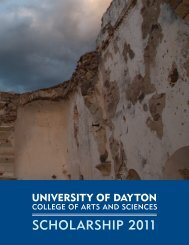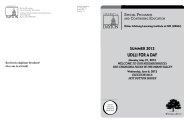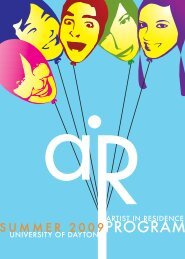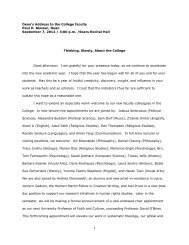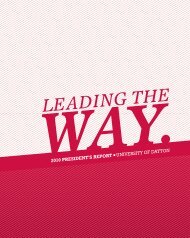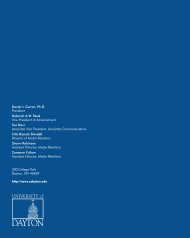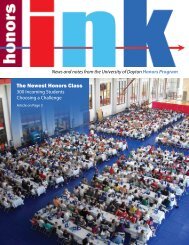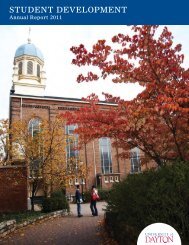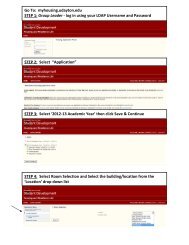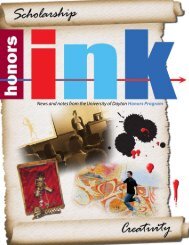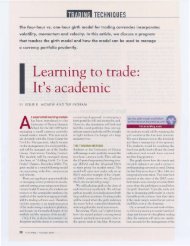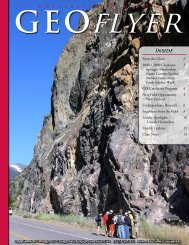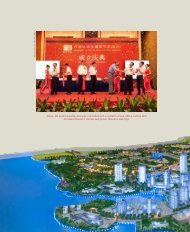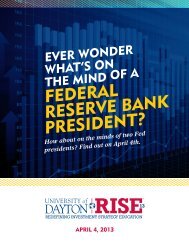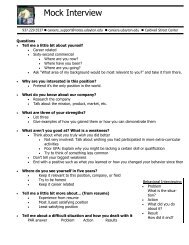Stander Symposium abstract book - University of Dayton
Stander Symposium abstract book - University of Dayton
Stander Symposium abstract book - University of Dayton
You also want an ePaper? Increase the reach of your titles
YUMPU automatically turns print PDFs into web optimized ePapers that Google loves.
9:00 AM to 5:00 PM<br />
The Many Different Faces <strong>of</strong> Modern Day Slavery<br />
Presenter(s): Aidan H Curran, Colin D Davidson, Luc-Rikardo R Fils, Anna L Godby, Nicholas J Hufford, Joseph<br />
M Morand, Sarah L Pagenstecher, Jacklyn V Smith, Samuel D Wagner<br />
Advisor(s): Anthony N Talbott<br />
Political Science<br />
2:00 PM-3:20 PM<br />
Course Project, 12_SP_POL_300_04 Kennedy Union - 310<br />
An estimated 27 million people are enslaved in the world today. Human trafficking, or the modern day slave trade, is the second largest criminal<br />
enterprise in the world and is the greatest human rights challenge <strong>of</strong> our time. A series <strong>of</strong> panels will present on various aspects <strong>of</strong> the issue:<br />
from an overview <strong>of</strong> human trafficking, to discussion <strong>of</strong> the many types <strong>of</strong> human trafficking, to an overview and evaluation <strong>of</strong> responses to the<br />
crime. Panelists will present information in a variety <strong>of</strong> formats, to include: discussion, presentation, audience interaction, and student shot video.<br />
Delivering Justice in Multicultural and Multiethnic societies<br />
Presenter(s): Madeline Bell, Maurice B Bell, Kathryn M Bruce, Solani T Harawa, Madison M Kramer<br />
Advisor(s): David J Watkins<br />
Political Science<br />
3:00 PM-4:00 PM<br />
Course Project, 12_SP_POL_300_H1 St. Joseph’s Hall - 23<br />
Living together under a single government and a single set <strong>of</strong> laws is a significant challenge, particularly in those societies marked by significant<br />
cultural, ethnic, racial, linguistic, and/or religious diversity. Each presenter in this panel discussion will present and discuss research on a particular<br />
challenge or controversy faced in a diverse society, ranging from religious conflict in Northern Ireland to the racial dimensions <strong>of</strong> felon disenfranchisement<br />
in the United States to the renaming <strong>of</strong> cities with explicitly “Hindu” names in India. Our goals will be to look for common themes in<br />
these seemingly divergent cases, and to consider what kind <strong>of</strong> normative theories, principles or rules might best help us navigate and understand<br />
these difficult situations.<br />
Politics <strong>of</strong> Genocide: Current Research<br />
Presenter(s): Molly C Daniels, Kathryn M Hoendorf, Kristina L Lucas<br />
Advisor(s): Alexandra Budabin<br />
Political Science<br />
Course Project, 12_SP_POL_300_08<br />
This panel will present current research on various projects related to the politics <strong>of</strong> genocide.<br />
156<br />
4:00 PM-5:00 PM<br />
LTC - Studio<br />
SUSTAINABILITY, ENERGY AND ENVIRONMENT INITIATIVE(SEE)<br />
Drinking for Change: <strong>Dayton</strong> Aquifer, Bottled Water, Student Choices and Your Ideas<br />
Presenter(s): Hailey Kwon, Benjamin M Schultheis, Abigail M Spohn<br />
Advisor(s): Leanne M Jablonski FMI<br />
Sustainability, Energy and Environment (SEE)<br />
Course Project, 12_SP_UDI_262_M1<br />
2:00 PM-3:00 PM<br />
Kennedy Union - East Ballroom<br />
<strong>Dayton</strong> sits atop one <strong>of</strong> the largest US aquifers with excellent drinking water quality; yet many UD students purchase bottled water. Disposable<br />
plastic bottles are harmful to the environment because they do not decompose, 70% are not recycled, and fossil fuels are expended in their manufacture<br />
and transportation. As part <strong>of</strong> the first-year Sustainability, Energy and the Environment (SEE) mini-course, we conducted a drinking water<br />
educational campaign while investigating reasons for bottled water purchase. Through interviews <strong>of</strong> River Stewards and Sustainability Club we<br />
learned about effective educational methods for changing behavior. We interviewed UD Dining Services to learn about their sustainability initiatives.<br />
Although UD has implemented sustainable practices such as reusable bottles, water refill stations and reduced prices for non-disposables,<br />
bottled water remains a large pr<strong>of</strong>it source as students bought 139,128 bottles in 2011. We observed student beverage choices on campus and<br />
discovered that many students chose tap water during cafeteria dining, but carried disposable bottles more frequently than using reusable bottles<br />
or drinking fountains. Students were surveyed for their buying frequency and preferences and their perceptions and knowledge about bottled



